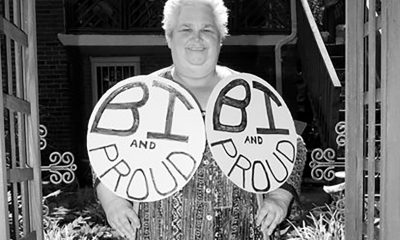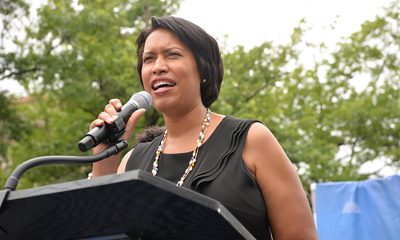Local
Jackson says he placed ‘curse’ on Blade
Anti-gay minister suggests he triggered former parent company’s 2009 shutdown
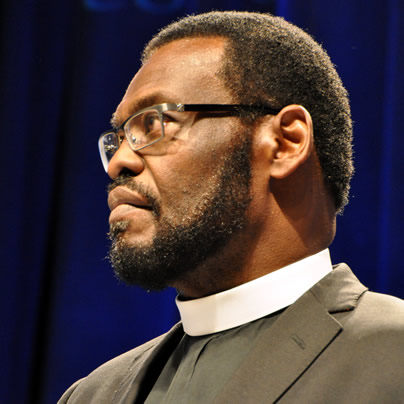
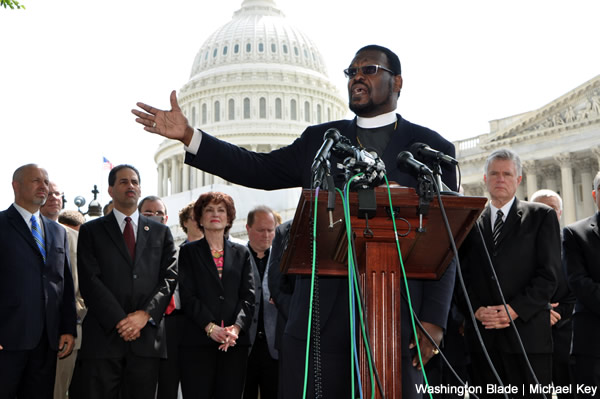
‘I laid hands on that newsstand and I said, ‘In the name of Jesus, I curse this paper!’ Harry Jackson said in a sermon, referring to the Blade. (Washington Blade file photo by Michael Key)
Bishop Harry Jackson Jr., the Maryland minister who led an unsuccessful campaign to overturn D.C.’s same-sex marriage law, told an audience last Sunday that he placed a curse on the Washington Blade in 2009.
In what appears to be a sermon that someone recorded and posted online, Jackson said he placed his curse on the Blade two months before the Blade’s November 2009 shutdown following a bankruptcy filing by its former parent company, Window Media.
“I remember one night I walked past one of those newsstands,” Jackson said, referring to one of the Blade’s sidewalk boxes used to distribute the paper.
“As I was walking past it I looked at that newsstand and it had some article about same-sex marriage — all of that stuff on it,” he said. “And I laid hands on that newsstand and I said, ‘In the name of Jesus, I curse this paper!”
Speaking in a loud voice, Jackson added, “In less than two months, the paper went bankrupt. It was part of a six-state, six newspaper chain. It went bankrupt! It went out of business! It went under!”
The sermon was first reported by Jeremy Hooper at GoodAsYou, the audio below was clipped from the original sermon posted to Jackson’s Hope Christian Church’s website.
Jackson didn’t mention in his sermon that the Blade’s staff continued to publish even after Window Media’s bankruptcy.
Within the next several months, three staff members formed a new company that later purchased the rights to the Washington Blade’s name from the bankruptcy court. The staff never missed a week of publishing during the upheaval.
Jackson didn’t respond to a request for comment.
Blade editor Kevin Naff said he found it interesting that Jackson is not aware of the Blade’s comeback.
“Harry Jackson has never let the facts get in the way of his misguided opinions,” Naff said. “He is comically misinformed about the Blade’s track record.”
In his sermon last Sunday, Jackson told of how he moved to D.C. from Maryland in 2009 to become “involved and ultimately become the leader” of the effort to kill D.C.’s same-sex marriage law through a voter referendum.
“So I get into the District and I started having all these stories written by this gay newspaper called the Blade,” Jackson said. “And they were writing these things – had me on the front page day after day,” he said.
Although he didn’t go into specifics, Jackson was referring to a series of stories the Blade published in early 2009 questioning whether Jackson was a legal D.C. resident at the time he registered to vote in the city and took out petitions to place a same-sex marriage referendum on the ballot.
The Blade reported that Jackson listed as his D.C. address an efficiency apartment in a condominium building near the Washington Convention Center that was ineligible for being rented to a tenant under the condominium’s rules.
The owner of the apartment told the condo board that Jackson was his roommate, according to sources at the upscale high-rise building. But LGBT activists raised questions about whether Jackson actually lived in the building. Other sources told the Blade Jackson and his wife were seen arriving and leaving the couple’s house in Silver Spring, Md., during the time Jackson claimed to be living in D.C.
The Blade stories prompted a Mt. Vernon Square neighborhood activist to file a complaint with the D.C. Board of Elections and Ethics challenging Jackson’s D.C. residency status. The board said it responded by investigating Jackson’s residency. It announced a short time later that it found Jackson’s living arrangement met the legal requirements of D.C. residency.
Jackson and his supporters lost their campaign to overturn the city’s same-sex marriage law when the D.C. Court of Appeals issued a ruling upholding a city law that prohibits ballot referendums on issues that could lead to discrimination. The appeals court held that the city has legal authority to ban referenda on certain issues.
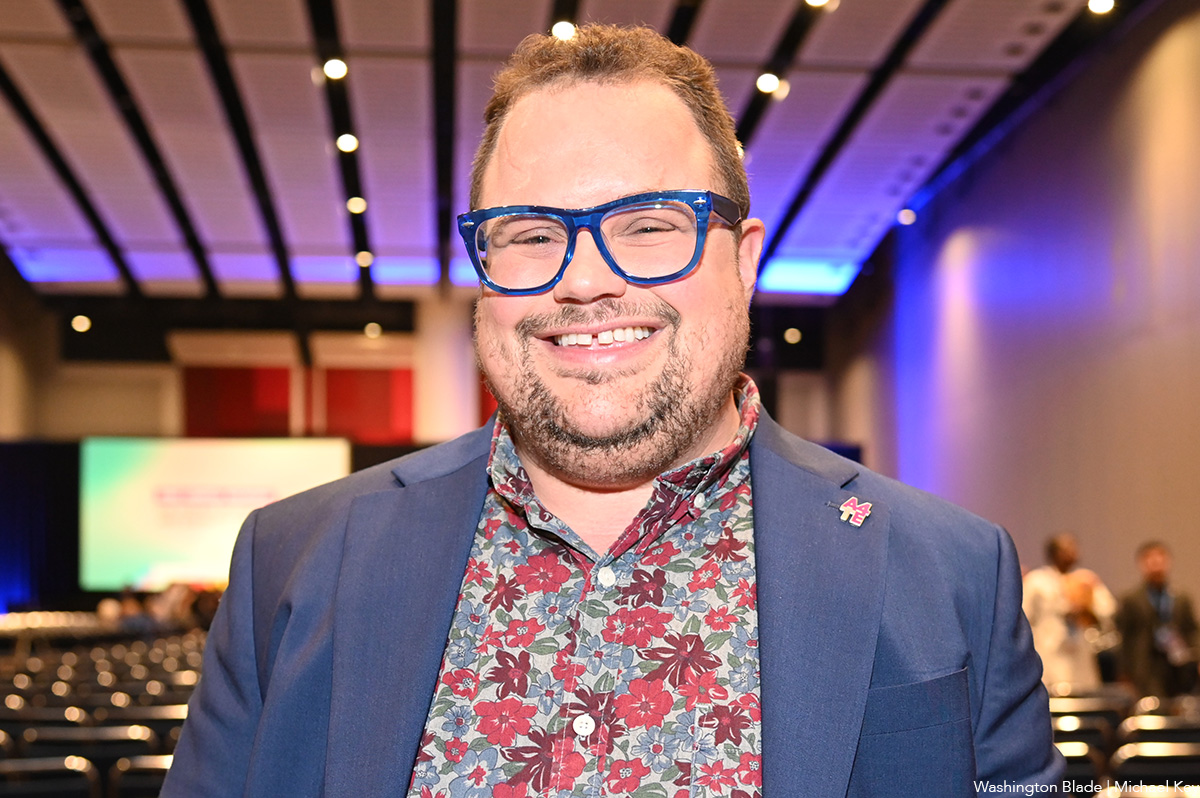
The Comings & Goings column is about sharing the professional successes of our community. We want to recognize those landing new jobs, new clients for their business, joining boards of organizations and other achievements. Please share your successes with us at [email protected].
Congratulations to RODRIGO HENG-LEHTINEN on his new role as Trevor Project Senior Vice President of Public Engagement Campaigns. On accepting the position, he said, “My mission has long been to stop LGBTQ, and especially trans, people from being perceived as political footballs and start getting us seen as real people – your friends, your families, your neighbors. Now I get to focus on that 100% at The Trevor Project.”
Prior to this, he was executive director, Advocates for Trans Equality (A4TE), where he co-led the merger of two national transgender rights organizations, NCTE and TDLEF, to create the new organization. He had served as executive director of the National Center for Transgender Equality, leading that organization through a period of growth, restoring organizational size and stability. He had served as deputy executive director prior to that. Previously he served as vice president of Public Education, Freedom for All Americans, where he led a successful campaign for transgender nondiscrimination protections in New Hampshire. He oversaw a full range of legislative lobbying, field organizing, and communications strategies and oganized a leadership coalition, established structure, and divided roles for key committees of 17 state and national partner organizations and local activists.
Heng-Lehtinen conducted English-language interviews with outlets such as The New York Times, CNN, MSNBC, and Politico. He planned a Transgender Leadership Summit for the Transgender Law Center and served as Development & Donor Services Assistant, Liberty Hill Foundation. He earned his bachelor’s degree in Latin American Studies from Brown University.
Local
D.C., Va., Md. to commemorate World AIDS Day
Cathedral of St. Matthew the Apostle will hold a Mass, candlelight prayer vigil
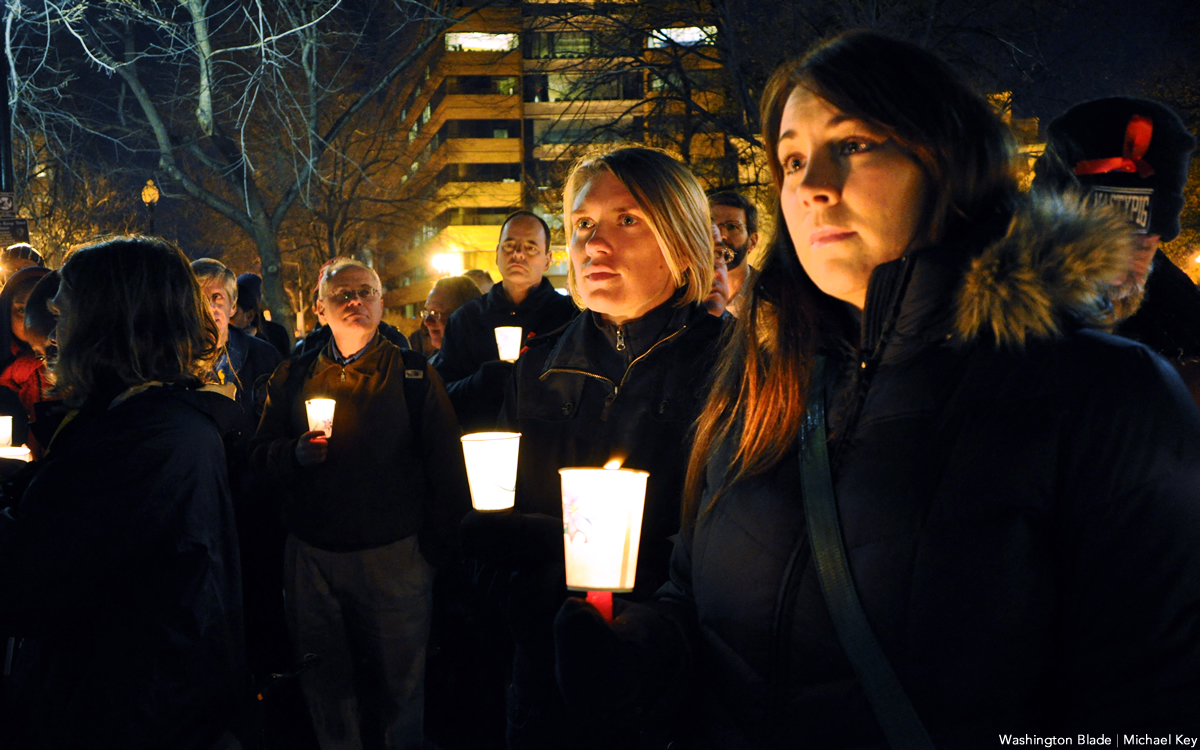
The D.C. area will observe World AIDS Day on Dec. 1 through a variety of community events.
Established by the World Health Organization in 1988, World AIDS Day aims to raise awareness about HIV/AIDS and honor the individuals affected by the epidemic. The global theme for 2025 is “overcoming disruption, transforming the AIDS response.”
Washington
DC Health will host a World AIDS Day event at the Martin Luther King, Jr. Library from noon to 9 p.m on Dec. 1. Attendees can expect live performances, free food and free HIV testing.
The all-day event will also feature community resources from DC Health, DC Public Library, DC Health Link, Serve DC, and the Mayor’s Office of LGBTQ Affairs.
The Lily and Earle M. Pilgrim Art Foundation is partnering with Visual AIDS, a New York-based non-profit that uses art to fight AIDS, to reflect on World AIDS Day with a film screening on Dec. 1.
The David Bethuel Jamieson Studio House at Walbridge in Mount Pleasant will premiere “Meet Us Where We’re At,” an hour-long collection of six videos. The free screening highlights the complexity of drug use in intersection with the global HIV epidemic.
The videos, commissioned by artists in Brazil, Germany, Nigeria, Puerto Rico and Vietnam, showcase the firsthand experience of drug users, harm reduction programs, and personal narratives. The program intends to showcase drug users as key individuals in the global response to HIV.
In addition to streaming the videos, the event will include an evening potluck and conversation led by Peter Stebbins from 6-8 p.m.
The Cathedral of St. Matthew the Apostle will hold a 5:30 p.m. Mass and candlelight prayer vigil at 6 p.m. in honor of World AIDS Day on Dec. 1. The event is open to all and includes a subsequent reception at 6:30 p.m.
The Capital Jewish Museum is hosting a speaker series on Dec. 2 from 6:30-8 p.m. that explores the response to AIDS within the Jewish community. Speakers include LGBTQ psychiatrist Jeffrey Akman, physician assistant Barbara Lewis and Larry Neff, lay service leader at Bet Mishpachah, a synagogue founded by LGBTQ Washingtonians. Heather Alt, deputy director of nursing at Whitman-Walker Health, will moderate the event.
The program is free for museum members. General admission is $10 and Chai tickets, which help subsidize the cost of general admission, are $18. Tickets include access to LGBT Jews in the Federal City, a temporary exhibition that collectively explores Washington, Judaism, and LGBTQ history. The exhibition is on view through Jan. 4, 2026.
Virginia
Alexandria Mayor Alyia Gaskins and local residents will commemorate World AIDS Day on Dec. 1 at the Lee Center.
The event, which is free to attend, will include music, choir performances, educational moments and more. The commemoration will be held from 6:30-8:30 p.m.
Maryland
The Frederick Center will host talks, tabling and a raffle in honor of World AIDS Day. The Frederick County Health Department will conduct free HIV testing.
The event, which is free to attend, will be held on Nov. 30 from 1-4 p.m. The Frederick County Health Department always offers free, walk-in HIV testing on Tuesdays and Fridays from 9 a.m. to 3 p.m.
The Prince George’s County Alumnae Chapter of Delta Sigma Theta Sorority will host a community day of awareness in honor of World AIDS Day on Dec. 6 from 1 a.m. to 2 p.m. The free event will feature free, confidential HIV testing, private talks with medical professionals and health workshops.
The event will be held at Suitland Community Center in Forestville and will include breakfast and snacks.
Damien Ministries is commemorating World AIDS Day on Dec. 1 through the grand opening of the We the People Community & Wellness Collaborative. The event, held at 11:30 a.m. at 4061 Minnesota Avenue, N.E., is free to attend.
Damien Ministries is a faith-based non-profit committed to supporting those with HIV/AIDS.
Begin Anew, a Baltimore non-profit that provides education, outreach and resources to improve public health, wellness and economic stability, is hosting its 4th Annual World AIDS Day Community Celebration on Dec. 1 alongside community partners.
Hosted at the University of Maryland BioPark from noon to 3 p.m., the program will feature keynote speaker Jason E. Farley of the Johns Hopkins School of Medicine. The celebration will also dedicate awards to local heroes focused on fighting HIV/AIDS and promoting health equity.
The free event includes lunch, live entertainment and networking opportunities with health advocates and partners.
District of Columbia
Bowser announces she will not seek fourth term as mayor
‘It has been the honor of my life to be your mayor’

D.C. Mayor Muriel Bowser, a longtime vocal supporter of the LGBTQ community, announced on Nov. 25 that she will not run for a fourth term.
Since first taking office as mayor in January 2015, Bowser has been an outspoken supporter on a wide range of LGBTQ related issues, including marriage equality and services for LGBTQ youth and seniors.
Local LGBTQ advocates have also praised Bowser for playing a leading role in arranging for widespread city support in the city’s role as host for World Pride 2025 in May and June, when dozens of LGBTQ events took place throughout the city.
She has also been credited with expanding the size and funding for the Mayor’s Office of LGBTQ Affairs, which was put in place as a Cabinet level office by the D.C. Council in 2006 under the administration of then-Mayor Anthony Williams.
It was initially called the Office of Gay, Lesbian, and Transgender Affairs. At Bowser’s request, the D.C. Council in 2016 agreed to change the name as part of the fiscal year 2016 budget bill to the Office of Lesbian, Gay, Bisexual, Transgender, and Questioning Affairs.
As she has in numerous past appearances at LGBTQ events, Bowser last month greeted the thousands of people who attended the annual LGBTQ Halloween 17th Street High Heel Race from a stage by shouting that D.C. is the “gayest city in the world.”
In a statement released after she announced she would not run for a fourth term in office; Bowser reflected on her years as mayor.
“It has been the honor of my life to be your mayor,” she said. “When you placed your trust in me 10 years ago, you gave me an extraordinary opportunity to have a positive impact on my hometown,” her statement continues.
“Together, you and I have built a legacy of success of which I am immensely proud. My term will end on Jan. 2, 2027. But until then, let’s run through the tape and keep winning for D.C,” her statement concludes.
Among the LGBTQ advocates commenting on Bowser’s decision not to run again for mayor was Howard Garrett, president of D.C.’s Capital Stonewall Democrats, one of the city’s largest local LGBTQ political groups.
“I will say from a personal capacity that Mayor Bowser has been very supportive of the LGBTQ community,” Garrett told the Washington Blade. “I think she has done a great job with ensuring that our community has been protected and making sure we have the resources needed to be protected when it comes to housing, public safety and other areas.”
Garrett also praised Bowser’s appointment of LGBTQ advocate Japer Bowles as director of the Office of LGBTQ Affairs,
“Under the leadership of the mayor, Japer has done a fantastic job in ensuring that we have what we need and other organizations have what they need to prosper,” Garrett said.
Cesar Toledo, executive director of the D.C. based Wanda Alston Foundation, which provides housing services for homeless LGBTQ youth, credits Bowser with transforming the Office of LGBTQ Affairs “into the largest and most influential community affairs agency of its kind in the nation, annually investing more than $1 million into life-saving programs.”
Toledo added, “Because of the consistent support of Mayor Bowser and her administration, the Wanda Alston Foundation has strengthened and expanded its housing and counseling programs, ensuring that more at-risk queer and trans youth receive the safety, stability, and life-saving care they deserve.”
Gay Democratic activist Peter Rosenstein is among those who have said they have mixed reactions to Bowser’s decision not to run again.
“I am sorry for the city but happy for her that she will now be able to focus on her family, and her incredible daughter,” Rosenstein said.
“She has worked hard, and done great things for D.C,” Rosenstein added. “Those include being a stalwart supporter of the LGBTQ community, working to rebuild our schools, recreation centers, libraries, gaining the RFK site for the city, and maintaining home rule. She will be a very hard act to follow.”
Local gay activist David Hoffman is among those in the city who have criticized Bowser for not taking a stronger and more vocal position critical of President Donald Trump on a wide range of issues, including Trump’s deployment of National Guard soldiers to patrol D.C. streets. Prior to Bowser’s announcement that she is not running again for mayor, Hoffman said he would not support Bowser’s re-election and would urge the LGBTQ community to support another candidate for mayor.
Bowser supporters have argued that Bowser’s interactions with the Trump-Vance administration, including her caution about denouncing the president, were based on her and other city officials’ desire to protect the interests of D.C. and D.C.’s home rule government. They point out that Trump supporters, including Republican members of Congress, have called on Trump to curtail or even end D.C. home rule.
Most political observers are predicting a highly competitive race among a sizable number of candidates expected to run for mayor in the 2026 D.C. election. Two D.C. Council members have said they were considering a run for mayor before Bowser’s withdrawal.
They include Councilmember Janeese Lewis George (D-Ward 4), who identifies as a democratic socialist, and Councilmember Kenyan McDuffie (I-At-Large), who is considered a political moderate supportive of community-based businesses. Both have expressed strong support for the LGBTQ community.
The Washington Post reports that Bowser declined to say in an interview whether she will endorse a candidate to succeed her or what she plans to do after she leaves office as mayor.
Among her reasons for not running again, she told the Post, was “we’ve accomplished what we set out to accomplish.”
-

 District of Columbia3 days ago
District of Columbia3 days agoBowser announces she will not seek fourth term as mayor
-

 U.S. Military/Pentagon4 days ago
U.S. Military/Pentagon4 days agoPentagon moves to break with Boy Scouts over LGBTQ and gender inclusion
-

 Drag4 days ago
Drag4 days agoPattie Gonia calls out Hegseth’s anti-LGBTQ policies — while doing better pull-ups
-

 District of Columbia4 days ago
District of Columbia4 days agoFadi Jaber’s Middle Eastern background shapes Adams Morgan bakery



